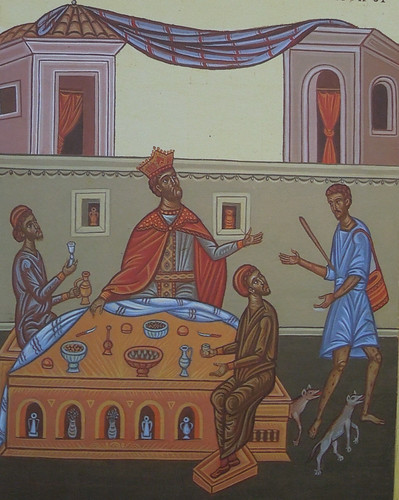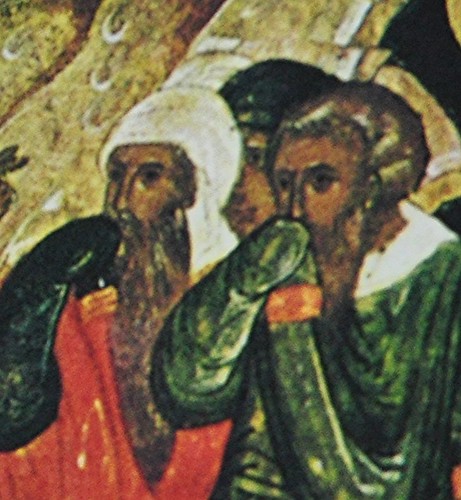The Gospel Lesson according to St. Luke 16:19-31 –
The the Lord Jesus told this parable:
There was a certain rich man who was clothed in purple and fine linen and fared sumptuously every day.
But there was a certain beggar named Lazarus, full of sores, who was laid at his gate, desiring to be fed with the crumbs which fell from the rich man’s table.
Moreover the dogs came and licked his sores. So it was that the beggar died, and was carried by the angels to Abraham’s bosom.

The rich man also died and was buried. And being in torments in Hades, he lifted up his eyes and saw Abraham afar off, and Lazarus in his bosom. Then he cried and said, ‘Father Abraham, have mercy on me, and send Lazarus that he may dip the tip of his finger in water and cool my tongue; for I am tormented in this flame.’ But Abraham said, ‘Son, remember that in your lifetime you received your good things, and likewise Lazarus evil things; but now he is comforted and you are tormented. ’And besides all this, between us and you there is a great gulf fixed, so that those who want to pass from here to you cannot, nor can those from there pass to us.’
Then he said, ‘I beg you therefore, father, that you would send him to my father’s house, ’for I have five brothers, that he may testify to them, lest they also come to this place of torment.’ Abraham said to him, ‘They have Moses and the prophets; let them hear them.’ And he said, ‘No, father Abraham; but if one goes to them from the dead, they will repent.’ But he said to him, ‘If they do not hear Moses and the prophets, neither will they be persuaded though one rise from the dead.’
St. Nikolai Velimirovic comments:
“The rich man’s soul was as full of sores as Lazarus’ […]
What sort of funeral did Lazarus the poor man have? It was like the burial of a dog that is found dead on the road. There must have been some civil authority to deal with dead beggars on the road, to give them burial for various reasons, and especially for two: the danger that dogs might tear his body to pieces and carry the pieces all over the city, and the fear that it would begin to stink, and thus spread infection in the city. In any case, the body must be got out of the city as quickly as possible and buried, because this dead body – twisted, covered with sores and tattered bits of clothing – offended the eyes of passers-by. None of these reasons were concerned with Lazarus, but all were directed towards the well-being of the city’s inhabitants. He, poor man, was a nuisance to others both during his lifetime and after his death.
The authorities could only wrinkle their noses at these unpleasant tidings, find men to carry out the disagreeable task and see how to pay for it. Word passed from tongue to tongue: Some beggar’s died; who’ll bury him? At whose cost? Who was he? So some curious child might ask. A foolish question; who would know and remember a beggar’s name?” (Homilies, pp 225 & 227)







Pingback: On Muttering and Forgetting the Poor – Saved Together